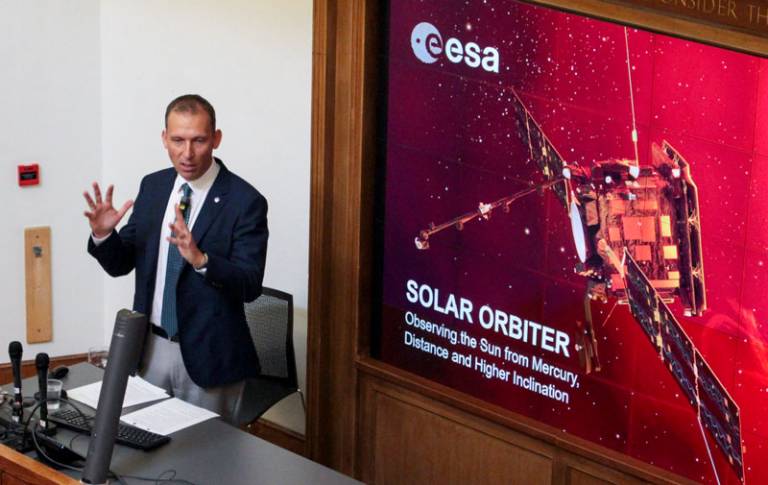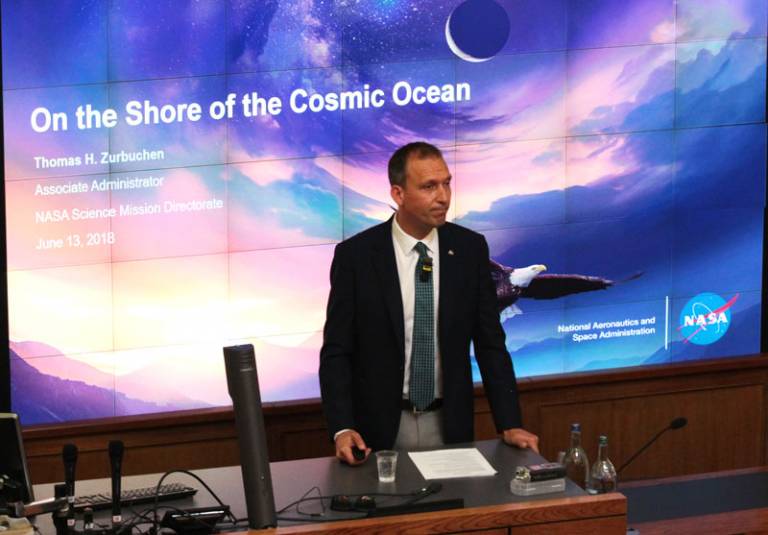Associate Administrator for NASA Space Mission Directorate, Dr Thomas Zurbuchen, visits UCL
19 June 2018
UCL welcomed Dr Thomas Zurbuchen, the Associate Administrator of NASA’s Science Mission Directorate, who visited UCL to give a talk titled ‘On the Shores of the Cosmic Ocean’.

UCL Space & Climate Physics welcomed Dr Thomas Zurbuchen, the Associate Administrator of NASA’s Science Mission Directorate, who visited UCL on Wednesday 13th June to give a talk titled ‘On the Shores of the Cosmic Ocean’.
Following his extensive research career in heliophysics at the University of Michigan, as well as several years working on spacecraft development for previous NASA missions, such as Mercury’s Messenger, Dr Zurbuchen was appointed Head of the Science Mission Directorate in October 2016.
The Swiss-American astrophysicist, also has a rich history of promoting enterprise and working with governments to foster new talent and research; in 2004, he received the US Presidential Early Career Award for Scientists and Engineers, thanks to the potential his research provided for prioritised government missions.
Dr Zurbuchen’s previous visits to UCL involved working with researchers from the Space Plasma Physics group at the UCL Mullard Space Science Laboratory, who were building instrumentation for ESA’s proposed Solar Orbiter mission for 2020, of which NASA is a partner.
He started this Wednesday’s talk by warmly introducing his passion for heliocentric physics, explaining that our understanding of the Sun is essential to our understanding of outer space, and gifting a NASA print of the central star to Professor Christopher Owen (UCL Space & Climate Physics).
Dr Zurbuchen then went on to outline the fundamental themes of science that drive the research delivered by NASA, including the search for life elsewhere, as well as the desire to discover secrets of the universe. He also emphasised the importance of asking unanswered, multidisciplinary questions, and notably remarked that, “Whenever you lock science into a box of what you already know...you lose”.

To the delight of the audience, Dr Zurbuchen also shared some of the latest work proposed and scheduled by interdisciplinary university research teams and international space agencies, which included a NASA mission called ICON launching in the same week as the talk, accompanied by vivid photographs from space.
Zara Hussein (Psychology BSc student) said, "It was so insightful to hear firsthand what NASA is about from someone so high up in the organisation - generally, everyone knows what it is, but it was interesting to hear Dr Zurbuchen's perspective on NASA, and the importance of the work they do at the Science Mission Directorate"
He shared his hopes for InSight, a robotic lander projected to land in Mars this November, which could lead to the first human landing on the planet. It could also provide essential data on Mars’ potential to host human life given a suitable thermal environment, which he outlined as yet another reason for the next generation of researchers to tap into unexplored avenues of research.
Moreover, Dr Zurbuchen shared projections of how public knowledge may change by 2020 given the modern pursuit of unreached high-altitude regions, and given the multitude of space missions sent to culminate in the next 2-3 years.
The truly captivating talk was then followed by a dynamic Q&A with audience members, where students shared questions and thoughts on the future of the nature of interplanetary research, for which Dr Zurbuchen shared his three most exciting areas of discovery: Mars, exoplanets and water worlds. He also emphasised the importance of adapting with change following discoveries in aquaplanet research, such as the heterogenous melting process of Arctic ice on Earth, which means that its current depletion is far more aggressive than previously agreed.
“Professor Christopher Owen (UCL Space & Climate Physics) who organised the event said, "It was a great pleasure to introduce Dr Zurbuchen to a UCL audience. Although he is now in a very senior position, he retains a long-standing connection to UCL as a partner in the international consortium led by UCL/MSSL providing the Solar Wind Analysers for the ESA/NASA Solar Orbiter mission.’
By Noor Garawi (2nd year Natural Sciences student)
 Close
Close

